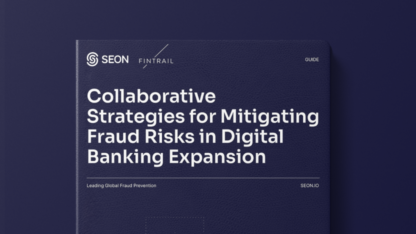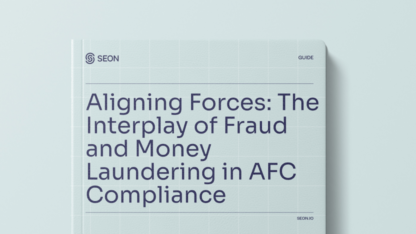This interview sees a dark web fraudster share their thoughts on OPSEC or operational security.
For episode 10 of the SEON Cat & Mouse show, our dark web research took us to Anonymous B.
As we’ve previously covered how fraudsters get into that line of work, and what they think of fraud prevention, we wanted to answer an important question: how do they ensure they remain anonymous?
This is what this fraudster had to say about the topic.
OPSEC is Really About Not Getting Caught
“So, for me, [OPSEC] is basically not to get caught. First and foremost, I have to stay under the radar of law enforcement agencies. I have to continue my operation remotely and just keep making money without thinking about going to prison.”
For Anonymous B, it’s too easy to slip and reveal some information that would allow their capture. In fact, they say a lot of their colleagues have been apprehended because of poor OPSEC.
“There are a lot of people out there trying to make money from fraud and they just get caught up in a few months because they don’t invest any time and energy into making the operation safe and undetectable.”
… And Never Connecting Your Real and Online Data
There’s one simple way to ensure you have good operational security (OPSEC). According to Anonymous B, the only thing you have to think about is creating a wall between your real and online identities.
“The only mistake you have to make to go to jail or prison is connecting your real-life identity to whatever you do. Let it be you ordering something to your own home address with a stolen credit card or, let’s say, you order to reception where they know you.”
But sometimes, the lines between online and real-life inevitably become blurred:
“You go to an ATM, which is in an area full of CCTVs, and then you make your home visible in front of the CCTV. There’s a lot of ways to get caught. So definitely hiding your track, hiding your identity, not connecting this info is the most important of all. It is basically what OPSEC means in this cyber-criminal world.”
Good OPSEC Takes Time and Effort
Another downfall of brazen fraudsters? They rush the OPSEC research. As Anonymous B explains:
“I spent like two or three months just studying OPSEC. How you can avoid cops knocking on your front door. It’s something you have to always allocate specific time to. What you can improve, what can you do to not reveal your own IP address, which is basically coming from your home or your mobile network that is probably under your name? So definitely it’s not enough just to sign up for a VPN provider and then think you are safe because there are many, many more other ways to get caught.”
Burner Phones and Bitcoins Are Must-Haves
When it comes to explaining which tools they rely on, Anonymous B confided that burner phones and cryptocurrencies are must-haves for fraudsters.
“I would strongly suggest getting a burner phone. Get a burner phone, which you purchased with cash from someone who doesn’t know you. Let’s say go to a second phone shop, pay cash for a smartphone, and then you should get SIM cards, from a store or second hand even.”
As for purchasing things online, anonymous or pseudonymous cryptos are as reliable as ever:
“To top up your SIM card, you should use a Bitcoin credit card, which would be connected to your name to a lot of your card providers. So basically, it’s like a normal card but with Bitcoins that are untraceable. Then your SIM card is untraceable and you can use it in your phone, then you can share your Wi-Fi as mobile hotspots with the computer, or you can use the phone for your activities.”
…So Are Other Tools of the Trade
In the later part of the interview, Anonymous B goes into more detail about the specific tools they use on a daily basis:
“Obviously you should never use your operating system or even not the same computer which you use for your normal life. So definitely, as I said, don’t just hide your mobile device, but if you work on a computer, I strongly suggest to get a second computer.”
Then, there are tools designed for the security industry that have been co-opted by fraudsters.
“There is one very, very good system called WHONIX. Basically, this works with a real-time machine set up. So, this machine basically channels your complete Internet connection to Tor. So on the second little machine in which you use your activity, you can be sure that it will not go through your normal computer connection in any way. So, your main computer with everything you do will go to Tor.”
How to Detect Fraudster OPSEC Attempts
One key takeaway from this interview is that successful fraudsters take operational security or OPSEC extremely seriously. As our interviewer and COO Jimmy Fong puts it, it’s like hygiene. Fraudsters have to think about it all the time and maintain best practices 24/7.
There were many more interesting points touched upon in the interview, including:
- How fraudsters vet VPN providers,
- Why public Internet places are dangerous to them,
- How often they switch their profiles and vendor names,
- What Anonymous B thinks about fraud prevention.
We highly recommend you give this one a listen, and read more about device spoofing and fingerprinting technology to flag more fraudsters like Anonymous B.
You might also be interested in reading about:
- SEON: How to Apply for a Loan with Stolen ID
- SEON: Social Engineering Attacks & Techniques
- SEON: Browser Spoofing: How it Works & for Fraud Detection
- SEON: Device Spoofing: How it Works & for Fraud Detection
Learn more about:
Data Enrichment | Browser Fingerprinting | Device Fingerprinting | Fraud Detection API | Fraud Detection with Machine Learning & AI








